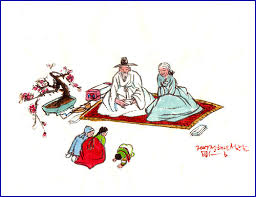COURSE DESCRIPTION
K202 is the second part of the second year Korean. The course
provides students with further conversational & grammatical skills
beyond those learned in the first semester. The objective of the course
is to equip students with communicative skills in speaking, reading, and
writing with more complex structures in Korean in an interemedite level.
Learning Outcomes: Students should reach Intermediate low in ACTFL Proficiency guidelines, and be able to do the following at the end of K202.
Communication
COMMUNICATE IN LANGUAGE |
1.1 Interpersonal |
1.2 Interpretive |
1.3 Presentational |
- Students participate in simple conversations on generally predictable topics related to daily activities and personal environment (e.g., campus life, health and exercises, classes, socialization).
- Students handle a limited number of uncomplicated communication tasks in straightforward social situation (e.g., planning an activity or outing).
- Students respond to requests for personal information and questions about immediate needs.
- Students ask simple questions to obtain information for basic needs, make requests, and negotiate simple exchanges.
- Students express personal meaning (e.g., preferences, interests) in short statements and discrete sentences.
|
- Students understand some information from reading simplest connected texts dealing with a limited number of personal and social needs.
- Students identity the main characters and storylines of illustrated stories using contextual and visual cues.
- Students understand some information from sentence-length speech in basic personal and social contexts, relying heavily on redundancy, restatement and contextual clues.
- Students interpret intonation and high frequency sentence enders to identity the function of an utterance (e.g., request, offer, exclamation).
|
- Students write or speak about personal information and well-known and rehearsed content (e.g., skits, rewriting songs, telling anecdotes).
- Students express meaning by combining and recombining known elements and conversational input
- Students use a few short and simple conversational-style sentences with repetitive structure and elementary vocabulary.
|
Particularly focused on:
- expressing various kinds of
speakers stances, evaluation, assessment, judgement and attitudes on the
events encountered, and more complex relations between two events such
as cause, reason, purpose, concession, intention, background, condition,
etc.
- Command a lengthy dialogue regarding
various topics such as birthday party, hair style and fashion, hobbies,
traditional holidays, marriage, jobs, etc.
- Carry basic conversation by asking simple questions and talking about familiar topics related to daily life.
See the 5C goals indetails here.
Classes are divided into two parts: two hours of lectures and three hours of drill sections. Lectures will include explanations of those conversational
patterns in grammatical and pragmatic terms. Drill sections will provide
the students with opportunities to practice in actual communicative situations
with various tasks and activities. Among the three drill sessions, Monday
will be designated mainly for reports on weekend, listening activities,
and weekly quizzes. Besides weekly quizzes on Monday, there are occasional
vocabulary and/or dictation quizzes.
COURSE MATERIAL
You will need a main textbook and a workbook for this class (both
available at the IU Bookstore and T.I.S.). (i) Main textbook: Integrated Korean: Intermedate 2 (2nd Ed.)
(ii) Workbook: Integrated Korean Workbook: Intermedate (2nd Ed.)
(iii) In-class material are available through web page: see WEEKLY
SCHEDULE
Students are expected
to create simulated dialogues based on the main conversations in each
lesson and to memorize set dialogues assigned for each task/function.
Written assignments will be given mainly from the Workbook. Students
are responsible to read the main textbook including main texts (conversations
and narrations), vocabuary (new words and expressions and notes), grammar
notes, as well as culture notes.
LAB ASSIGNMENTS
Lab attendance is required. For each week, you are expected to do the
assigned lab material at least for 1 hour. Writeup assignments will also
be given regularly on the lab material.
In order to take advantage of the lab material effectively the
following procedures are advised:
Step 1. Listen to the tape without written material to
see how much you could understand.
Step 2. Listen to the same part again, with the written
material
Step 3. Repeat after the model for each utterance (avoid
using the written material as much as you can).
Step 4. Go over the material again without written material.
Make sure you understand the material thoroughly.
Step 5. Give yourself a dictation test on the main texts.
(Strongly recommended to enhance your listening and writing skills as well
as improving your spellings)
Go to Top
GRADING
Students will be evaluated for the final grade based on the following
percentage.
| Class Attendance * |
15% |
| Class Participation** |
10% |
| Assignments*** |
10% |
Vocabulary Quizzes |
5% |
| Chapter Quizzes |
15% |
| Class activity documents |
5% |
| Midterm Examination: TBA |
10% |
| Oral Performance (Skits & Oral Reporting) |
10% |
| Oral Final Examination: TBA |
5% |
| Written Final Examination: 2:45-4:45 p.m., Thurs., May 3 |
15% |
* Attendance check will be strictly enforced; No excuses are allowed unless a written proof of inevitable circumstances (e.g. doctor's notes, police reports, parents' notes, performance schedule, job interview schedule, etc.). Documents should be submitted to Prof. Lee, NOT to your AIs. In any circumstances, no more than 5 excuses will be granted.
More than 10 unexcused absences will result in an automatic F.
[NOTE] You will not be able to advance to K301 if you get C- or lower.
Those who will not have missed any class will get awarded 5 days of Extra credit (about 1% of the total grade); if your absence is zero due to the excuses granted, the number of excuses will be deducted from the 5 days of extra credit. [Note: Extra-credits will not erase your absences.]
Extra-creditswill be granted for:
(i) Participating in Korea-related events including Korean Conversation Club meetings, Korean movie nights, lectures on Korea, etc. and submitting a report on the event is submitted in Korean.
(ii) Posting a message in Korean in the iubkorean FaceBook group.
** Your performance in each drill section will be monitored and graded by your drill instructor each day. The grading criteria not only includes your Korean language performance, but also your attitude, punctuality, cooperation, preparation and participation.
*** Homeworks are due at the beginning of each class of the day specified as deadline. A homework submitted after the class, including for the homework for the day your excused absence will be counted as a late homework. All the homeworks are to be submitted to your AI.
Late homework must be handed in within a week from the deadline: the maximum point for late homework will be 10% less for each day delayed; any homework submitted later than a week past the deadline will be corrected, but no credit will be granted.
If you miss a class, excused or not, the homework due on that day must be submitted before the class (an e-mail submission is fine).
Grades will be assigned based on the following scale:
|
97+
|
A+ |
93+
|
A |
90+
|
A- |
|
87+
|
B+ |
83+
|
B |
80+
|
B- |
|
77+
|
C+ |
73+
|
C |
70+
|
C- |
|
67+
|
D+ |
63+
|
D |
60+
|
D- |
|
below 60
|
F |
|
|
|
|
There will be no round up; use all the extra-credit opportunities as possible.
There will be no makeup exam unless provided with a written proof for
a justifiable reason. Any makeup exam must be taken within one week from
the day the student resumes to class.
I.U. Code of Student Rights, Responsibilities and Conduct
Academic misconduct is defined as any activity that tends to undermine the academic integrity of the institution. The university may discipline a student for academic misconduct. Academic misconduct may involve human, hard-copy, or electronic resources.
Academic Integrity: As a student at IU, you are expected to adhere to the standards and policies detailed in the Code of Student Rights, Responsibilities, and Conduct (Code). When you submit an assignment with your name on it, you are signifying that the work contained therein is yours, unless otherwise cited or referenced. Any ideas or materials taken from another source for either written or oral use must be fully acknowledged. All suspected violations of the Code will be reported to the Dean of Students and handled according to University policies. Sanctions for academic misconduct may include a failing grade on the assignment, reduction in your final course grade, and a failing grade in the course, among other possibilities. If you are unsure about the expectations for completing an assignment or taking a test or exam, be sure to seek clarification beforehand.
Re: Note Selling: Several commercial services have approached students regarding selling class notes/study guides to their classmates. Selling the instructor’s notes/study guides in this course is not permitted. Violations of this policy will be reported to the Dean of Students as academic misconduct (violation of course rules). Sanctions for academic misconduct may include a failing grade on the assignment for which the notes/study guides are being sold, a reduction in your final course grade, or a failing grade in the course, among other possibilities.
Additionally, you should know that selling a faculty member’s notes/study guides individually or on behalf of one of these services using IU email, or via Canvas may also constitute a violation of IU information technology and IU intellectual property policies and additional consequences may result.
* Plagiarism: Plagiarism is a serious academic misconduct that violates
academic ethics and IU Code of student misconduct.
Go to Top |



